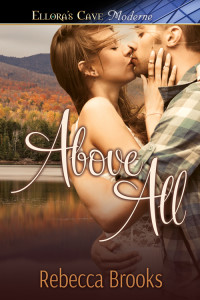 Today I’m welcoming a guest post by debut romance novelist Rebecca Brooks, author of the erotic romance Above All.
Today I’m welcoming a guest post by debut romance novelist Rebecca Brooks, author of the erotic romance Above All.
When my debut contemporary erotic romance Above All was published this month, I was in touch with several reviewers who wanted to know more about the book. Does it have a happy ending? (Yes!) Is there anything dark or disturbing they should be aware of? (Nope—just beautiful scenery and really good food.)
One reviewer had a specific request. Before she agreed to read Above All, I had to answer a simple question. Is there anything stupid in it? Answer honestly, she added.
I’m dying to know whether anyone actually says yes. But the more I’ve thought about it, the more I’ve come to see what a great question it is.
Every story needs conflict. There’s a reason Happily Ever After comes at the end, not the beginning. Hero and heroine meet, forces pull them apart, but we know they’ll find their way together again. Forces of Evil make stories juicy—well, that and great sex. But tension is the crème filling. Without it, all the chocolately goodness gets dry.
It’s hard to find interesting, plausible reasons to push hero and heroine apart. Too big an issue and there’s no reason for them to get back together—who wants to return to an asshole? Too weak and that’s exactly what the story becomes. I’ve read plenty of books where the pair could resolve their giant misunderstanding in five minutes if they sat down and talked to one another as people in love are sometimes known to do.
So I get what this reviewer was asking. Is there anything dumb, irritating, or utterly flimsy driving the hero and heroine apart? No one wants to read about characters who are whiny, petulant, and overly dramatic, jumping to conclusions and creating drama just to manufacture plot. There’s only so much I want to throttle a character before I’d rather put down the book.
But I find myself feeling a little prickly about this word stupid. The terms I’ve used to describe it, the emphasis on drama and an absence of thought, clarity, or self-reflection—aren’t these the very insults hurled at women all the time? Hysterical. Irrational. Overreacting. Overly emotional.
And so now some stubborn, contrary part of me—the part that someone reading the story of my life would probably call stupid—wants to keep a space for the illogical, the emotional, the thing that might not be perfect but is, in the moment, the truest expression of the self.
In my own novel, Above All, Casey’s family thinks she’s nuts for leaving her unhappy life in New York City and starting over in the Adirondacks. But the reader knows she’s right where she belongs. Meanwhile Ben’s overbearing father wants Ben to work at a fancy Italian restaurant in Manhattan instead of opening his dream café. If we’re going to judge whether something is stupid, then shouldn’t we be asking, stupid to whom?
The reader might want to smack Ben upside the head for even considering anything that would take him away from the woman he’s meant to be with. But is Ben stupid for finding himself pulled in different directions? Is he stupid for ever experiencing doubt? I don’t think so! I think he’s being human. The distinction between stupid and flawed comes down to whether Ben is being authentically Ben, true to his character when he vacillates over what kind of life he wants for himself.
Perfect communication and decision-making don’t make for a very good novel. But if characters are genuine and multidimensional, if they feel so real you want to invite them over for coffee and chat about their lives, if you’re sad when they’re sad and their butterflies flit around in your stomach too, if you believe their anger, confusion, and hurt, and understand why they do things that might not always look “right”—then they won’t be stupid, no matter what dumb things they might do.
 Rebecca Brooks lives in New York City in an apartment filled with books. She received a PhD in English but decided it was more fun to write books than write about them. She has backpacked alone through India and Brazil, traveled by cargo boat down the Amazon River, climbed Mt. Kilimanjaro, explored ice caves in Peru, trekked to the source of the Ganges, and sunbathed in Burma, but she always likes coming home to a cold beer and her hot husband in the Bronx. Her books are about independent women who leave their old lives behind to try something new—and find the passion, excitement and purpose they didn’t know they’d been missing.
Rebecca Brooks lives in New York City in an apartment filled with books. She received a PhD in English but decided it was more fun to write books than write about them. She has backpacked alone through India and Brazil, traveled by cargo boat down the Amazon River, climbed Mt. Kilimanjaro, explored ice caves in Peru, trekked to the source of the Ganges, and sunbathed in Burma, but she always likes coming home to a cold beer and her hot husband in the Bronx. Her books are about independent women who leave their old lives behind to try something new—and find the passion, excitement and purpose they didn’t know they’d been missing.
You can find out more about Rebecca on her website, Facebook page, or on Twitter, and you can check out and purchase Above All on Amazon or Ellora’s Cave.
**Rebecca will also be running a giveaway with copies of her book plus an Amazon gift card through August 18th! Click here to find out more.**

Really enjoyed reading this thoughtful take on how to see characters/motivations and how we gender stupidity.